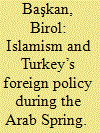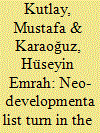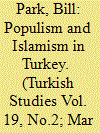| Srl | Item |
| 1 |
ID:
158734


|
|
|
|
|
| Summary/Abstract |
The results of the 2002 general election in Turkey came as a powerful shock to multifarious circles both within and outside the country. There were deep concerns that the ‘moderate’ Islamic-oriented Justice and Development Party (AKP) might try to dismantle the very bases of the secular state. Fifteen years of AKP rule have displayed four distinctively different periods: (1) Normalization and reinstitution of civil governance (2002–2007); (2) Methodological transition (2007–2009); (3) Consolidation of power-base (2009–2011); and (4) De-secularization, de-democratization, re-securitization and shift to authoritarianism (2011–2016). Drawing upon the ‘competitive authoritarianism’ literature and the concept of ‘instrumentalization of democracy,’ this article will elaborate the above points as well as the intrinsic Islamist mindset of the AKP. Use of foreign policy as an instrument of legitimation of Islamist policies and anti-secular transformation will also be examined.
|
|
|
|
|
|
|
|
|
|
|
|
|
|
|
|
| 2 |
ID:
158737


|
|
|
|
|
| Summary/Abstract |
The Arab Spring truly caught Turkey by surprise. In interpreting what was happening in the region, Turkey’s foreign policy-makers relied on a particular view, which helped steer Turkey’s foreign policy in the ensuing regional earthquake. This article seeks to dissect that view and deconstructs its main components mainly through the speeches of Ahmet Davutoğlu, who served as Turkey’s Minister of Foreign Affairs during the heyday of the Arab Spring. The paper also illustrates how Davutoğlu’s interpretation heavily borrows from the Islamist interpretive frame of modern Turkish history. That frame, this article claims, originated in the late Ottoman period and has since evolved in contestation with alternative readings, both official and non-official. The article suggests that Davutoğlu’s view of the Arab Spring helps explain why Turkey welcomed the Arab Spring and advised Arab regimes to implement political reforms.
|
|
|
|
|
|
|
|
|
|
|
|
|
|
|
|
| 3 |
ID:
158739


|
|
|
|
|
| Summary/Abstract |
The 2008 global economic crisis galvanized the debate on neo-developmentalism as the pendulum of economic thinking began to swing away from neoliberalism. The current shift in the modalities of market governance mainly deals with the ways through which industrial policies can be crafted in a more open-economy setting. Accordingly, the post-crisis literature turns a keen eye on the state’s developmental role in the research and development (R&D) sector in an age of ‘bit-driven’ global political economy. On that note, the nature, properties, and limits of state policies of emerging powers in this particular realm are becoming increasingly central but remain an understudied theme. This article discusses the R&D policies of Turkey from a state capacity perspective and questions the rationale of those policies by linking the state’s transformative capacity to the discussions on distributive pressures. Drawing on 21 in-depth semi-structured interviews, this article assesses Turkey’s R&D policies.
|
|
|
|
|
|
|
|
|
|
|
|
|
|
|
|
| 4 |
ID:
158736


|
|
|
|
|
| Summary/Abstract |
This article aims to analyze how history has been used as a political discourse by the current ruling elites of Turkey in the post-2010 period. In doing that, the article first defines what the politicization of history is and locates the Justice and Development Party’'s (Adalet ve Kalkınma Partisi, AKP) perception of history within the broader conservative political movements in Turkey. Then, the article focuses on the discourses of some AKP politicians and pro-AKP journalists to show how the AKP has been using history as a discourse to create a binary opposition between the Unionist/CHP mentality and the AKP mentality and to label the latter as the source of all current political troubles of Turkey.
|
|
|
|
|
|
|
|
|
|
|
|
|
|
|
|
| 5 |
ID:
158733


|
|
|
|
|
| Summary/Abstract |
A revisionist tone that has created several crisis has become more pronounced in Turkish foreign policy. This trend has been particularly evident after 2010 when the AKP consolidated its power base, the military's tutelage over politics subsequently disappeared and the Arab Spring opened a new window of opportunity for Turkey in the Middle East. This has been surprising because de-militarization of political space was envisioned to produce more cooperative stances in the globalized post-Cold War world. This trend has occurred alongside what many would argue has been the AKP's authoritarian and Islamist agenda. Such an argument suggests that earlier the AKP had pragmatically used democratic values and integrationist policies to weaken the military, and then adopted Islamism in foreign policy and authoritarianism in domestic politics. This study aims to explore the common characteristics of the AKP in domestic and international realms while the extant paradigm tends to divide the AKP period into two categories, which are democratic/pro-western and authoritarian/Islamist. In order to suggest a common characteristic to identify the AKP's domestic and foreign policy in a holistic manner, this article applies the term ‘populism’ to describe a number of AKP policies and positions.
|
|
|
|
|
|
|
|
|
|
|
|
|
|
|
|
| 6 |
ID:
158730


|
|
|
| 7 |
ID:
158732


|
|
|
|
|
| Summary/Abstract |
This paper reviews the evolution of the Adalet ve Kalkınma Partisi (AKP)’s civilizational outlook vis-à-vis the West as a discursive instrument that justified its Muslim democracy practices as well as its nativist authoritarian practices. The former practice entails that the AKP appear as a Muslim democratic political force, reconciling Islam and democracy, falsifying the Orientalist essentialism prevalent in the West and resolving the crisis in Turkey’s Western identity. After relieving the secular establishment of its guardianship roles in 2010/2011, the AKP’s nativist practices have aimed at redefining Turkey as a Muslim nation by using a civilizational discourse. As such, the AKP’s nativism was characterized by an attempt at resetting the legitimate parameters of Turkish politics to reject the validity of the universal norms of democracy and the legitimacy of their domestic and international proponents. This naturally entailed a populist anti-establishment stance in foreign as well as domestic policy realms.
|
|
|
|
|
|
|
|
|
|
|
|
|
|
|
|